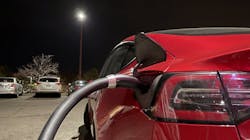Milestone Reached for SAE J3400 EV Charging Connector Standard
In a recent press release, the Joint Office of Energy and Transportation applauded the release of a milestone for the new SAE J3400 standard for the Tesla-developed connector used to charge electric vehicles (EVs). According to the release, the SAE International Technical Information Report (TIR) is a key step in the standards development process to define the design, construction, and technical characteristics of motor vehicle components like the connectors and inlets used to charge EVs. Developed at a rapid pace in collaboration with a task force of experts from the public and private sectors, the release of the SAE J3400 TIR moves the North America Charging Standard (NACS) connector independently developed by Tesla towards an open industry standard that can be updated and maintained through a collaborative industry process moving forward.
The new SAE J3400 connector will ensure that any vehicle or charging equipment supplier or manufacturer will be able to use, manufacture, or deploy the connector and expands charging access for current and future EV drivers across the country.
Minimum requirements for federally funded chargers published in 2023 by the Federal Highway Administration (FHWA) were designed to be flexible, creating space for innovation and additional connector types. As multiple automakers announced their intention to use NACS, the Joint Office said it became clear the industry needed an independently administered standard for the connector to enable an interoperable and seamless charging experience. The Joint Office worked with the SAE International, the industry leader in automotive standards, to develop a process and timeline for standardization that advanced at unprecedented speed. Visit DriveElectric.gov to learn more about the standards development process for SAE J3400.
Many major automakers are expected to begin offering J3400 -equipped vehicles beginning in 2025, and will support J3400 compatibility through adaptors beginning in 2024. FHWA announced it will soon publish a Request for Information (RFI) to inform how new technology and innovation, like the J3400 connector, are incorporated into its minimum requirements.
The tightly scoped J3400 standard creates design frameworks for the mechanics and electrical signaling for the connector, which are key to a reliable, safe, and consistent EV charging experience. Designed to work with standard communications protocols, it also dramatically increases access for EV drivers to an expanded and interoperable national charging network. The standard leverages existing technology building blocks that will enable a broad foundation of resiliency, security, and equity.
